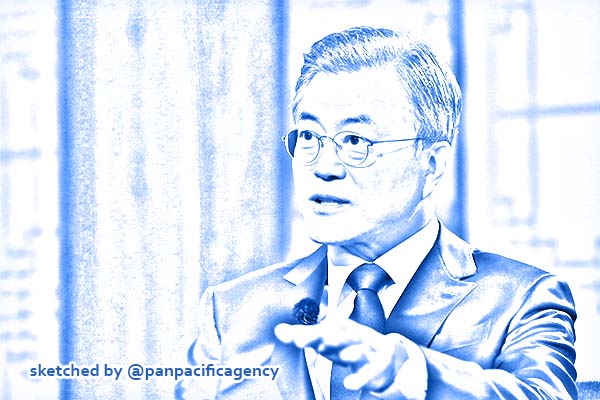[Analytics] A role for ASEAN on the Korean Peninsula?

President Moon Jae-in speaks during a live interview with public broadcaster KBS at Cheong Wa Dae in Seoul on May 9, a day before the second anniversary of his taking office. (Yonhap) Sketched by the Pan Pacific Agency.
ASEAN–South Korea relations have grown substantially since President Moon Jae-in’s launch of the New Southern Policy (NSP). In line with his intention of elevating South Korea’s relations with ASEAN to the level of major powers, Moon became the first South Korean president to visit all 10 ASEAN member states. South Korea also became the first ASEAN dialogue partner to host three Commemorative Summits with ASEAN in 2019. Teo Ang Guan specially for the East Asia Forum.
The people-to-people exchanges and trade relations between the two regions are skyrocketing to unprecedented levels. But cooperation on the strategic front is lagging behind the economic and socio-cultural dimensions of ASEAN–South Korea relations. This dynamic is obvious in the Co-Chairs’ Statement of the recent Commemorative Summit, where concrete measures on strategic affairs remained elusive and glossed over by rhetorical joint commitments. The commitment ‘to further enhance cooperation to address traditional and non-traditional threats to regional peace and security’ after the 20th ASEAN–ROK Summit held in 2018 also saw little tangible results.
Yet as middle powers in an increasingly turbulent region of great power rivalry, ASEAN and South Korea share similar interests and outlooks on numerous strategic issues, such as the Korean Peninsula. Moon noted that ASEAN and South Korea are working together to ‘resolve the North Korean nuclear issue for regional peace and stability’ and to ‘establish peace on the Korean Peninsula’. But there has been limited real commitment to translate these aspirations into policy outputs.
Progress made in recent years between South and North Korea is crumbling. In June 2020, North Korea blew up the Inter-Korean Liaison Office in Kaesong and North Korean leader Kim Jong-un has returned to emphasising the importance of the North’s nuclear program despite earlier expressing a willingness to denuclearise.
In contrast to North Korea’s behaviour towards South Korea and the United States, North Korea’s Ministry of Foreign Affairs released a statement highlighting the country’s willingness to work within the ASEAN Regional Forum (ARF) to achieve ‘peace and stability on the Korean Peninsula and in the region’, claiming it ‘appreciated’ ASEAN’s fairness in dealing with the country after the ARF Senior Officials’ Meeting (SOM) in July 2020.
President Moon has lobbied for ASEAN to engage with North Korea on its denuclearisation efforts. But conditioning engagement based on the pace of Pyongyang’s denuclearisation could lead to the attempt failing altogether. Regime security and denuclearisation are essentially two sides of the same coin in the minds of the North Korean elite. It is a tall order for ASEAN and South Korea to guarantee the former. Tying the two together could create an all or nothing situation.
Instead, ASEAN and South Korea should try to engage North Korea with the aim of consolidating Pyongyang into the regional security architecture via ASEAN-led mechanisms. They should work together to ease the trust deficit Pyongyang faces with the world, especially Washington. Moon continues to push for a third summit despite recent incidents. Given the level of distrust between Washington and Pyongyang, Moon should consider alternatives and channel an appropriate level of resources to other endeavours to engage North Korea. For a start, ASEAN and South Korea can together strengthen their respective relations with the North.
The ARF has received much attention, but little has been achieved on that front. Rather than harping on institutionalising engagement via formal mechanisms, the focus should shift to smaller steps like an ad-hoc basis informal setting that mirrors the ASEAN Foreign Ministers’ Retreat. As Singapore’s former foreign minister Shunmugam Jayakumar expressed, the retreat has helped to promote ‘frank and candid discussion’ between ASEAN members.
The keys to its success are that ministers are not forced to orchestrate a substantive outcome and details are kept off the record, with the sole written document from the retreat being a press statement released by the Chairman.
This ad-hoc retreat can be actualised in three distinct ways. First, ASEAN can extend a one-off invite to the two Koreas’ foreign ministers. Second, ASEAN could extend the existing retreat and allocate a specific timeslot for the participation of the two Koreas’ foreign ministers. Alternatively, this session could take place within the ARF. Whether this informal session continues should be conditional on the results of the first.
But obstacles remain. North Korea must be a willing partner and external parties — the United States, China, Japan and Russia — must be assured that their respective interests are not compromised in a diplomatic setting that excludes their direct participation. ASEAN and South Korea must work to secure their buy-ins.
ASEAN’s efforts so far in keeping North Korea in the ARF, even when calls to suspend North Korea’s membership were strong, is a testament to its contribution to help the world engage Pyongyang more effectively. But the ARF cannot be the be-all and end-all. ASEAN should work alongside partners like South Korea to find new means of improving North Korea’s integration with the region.
While the world is absorbed in the fight against the COVID-19 pandemic, long-term strategic challenges are intensifying behind the scenes. Amid the uncertainties looming over the Korean Peninsula, it is high time for ASEAN and Seoul to step up.
Teo Ang Guan is a student at Nanyang Technological University. This article is an adaptation of a winning entry in the 2019 ASEAN-Korea Academic Essay Contest organised by the ASEAN-Korea Centre.